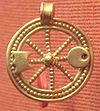Cicolluis
CicolluisorCicoluis(also known asCicollus,Cicolus,Cicollui,andCichol) is agod in Celtic mythologyworshiped by the ancientGaulsand having a parallel inIreland.
Name
[edit]TheGaulishtheonymCicollu(i)sderives from the stemcico-, itself fromProto-Celtic*kīko-,meaning 'meat, flesh, muscle' (cf. Old Bretoncic-, Middle Welshcig'meat') and, bymetonymy,'breast' (cf. Middle Irishcích).[1][2]It could be translated as 'Big-Muscle' or 'Great-Breast'.[1][3]
Cult
[edit]Roman Gaul
[edit]In theGallo-Roman religion,Cicolluis is thought to be a commonepithetfor the Gaulish equivalent ofMars.[4]ALatindedicatory inscription fromNarbonne(which was in the far south of Gaul), France, bears the wordsMARTI CICOLLUI ET LITAVI( “Mars Cicolluis andLitavis”).[5],[6]“Mars Cicolluis” has dedications inXanten,Germany, andAignay-le-Duc(where his consort is given as Litavis) andMâlain(where his consorts are given as Litavis andBellona,Roman goddess and personification of war) of theCôte-d'Or,France. “Cicolluis” is named alone (not as an epithet of Mars) in an inscription atChassey,Côte-d'Or,Franche-Comté,France, and a partial inscription fromRuffey-lès-Echirey,Côte-d'Or, France, may be dedicated to Cicolluis. InWindisch, Switzerland,he is known as “Cicollus,” and inDijon,Côte-d'Or, France, he is known asMars Cicoluis.[4]
Ireland
[edit]Cicolluis may also be compared toCichol or Cíocal Gricenchos,the earliest-mentioned leader of theFomoriansor Fomóiri (the semi-divine initial inhabitants of Ireland) inIrish mythology.According to the seventeenth-century Irish historian Seathrún Céitinn (also known by the English nameGeoffrey Keating), Cichol arrived in Ireland with fifty men and fifty women on six boats a hundred years after theFlood.There, his people lived on fish and fowl for two hundred years untilPartholónand his people (who brought the plough and oxen) invaded and defeated the Fomorians in the Battle ofMagh Ithe.[4]
References
[edit]- ^abDelamarre 2003,p. 116.
- ^Matasović 2009,p. 204.
- ^Lyle, Emily (2018).Celtic Myth in the 21st Century: The Gods and their Stories in a Global Perspective.University of Wales Press. p. 62.ISBN978-1-78683-206-1.
- ^abcEvans, Dyfed Lloyd. “Cicolluis: A Gaulish and Irish God, Also Known as Cicollus, Cicolus, Cichol (Great-Breasted).”Celtnet: Nemeton.22 May 2007 <http://www.celtnet.org.uk/gods_c/cicolluis.htmlArchived2007-09-27 at theWayback Machine>.
- ^Koch, John T. “Ériu, Alba, and Letha: When Was a Language Ancestral to Gaelic First Spoken in Ireland?”Emania: Bulletin of the Navan Research Group9 (1991): 17–27.
- ^Gwinn, Christopher. “Re: Litavi.”LISTSERV15.0: OLD-IRISH-L Archives.31 Dec. 2000, 13:48:19 −0500.L-Soft.22 May 2007 <https://listserv.heanet.ie/cgi-bin/wa?A2=ind0012&L=old-irish-l&P=10754>.
Bibliography
[edit]- Delamarre, Xavier(2003).Dictionnaire de la langue gauloise: Une approche linguistique du vieux-celtique continental.Errance.ISBN9782877723695.
- Matasović, Ranko(2009).Etymological Dictionary of Proto-Celtic.Brill.ISBN9789004173361.
External links
[edit]- A sectionof theLebor Gabála Érennrelating to Ciccul Gricenchoss and its translation into English by Jonathan Slocum, Patrizia de Bernardo Stempel, and Caren Esser
- Etymological translationsof “Cicolluis,” “Cicollus,” “Cicos,” etc. by Patrick Cuadrado (inFrench);automatic Google translation into English


